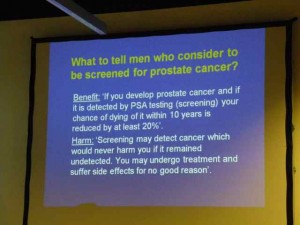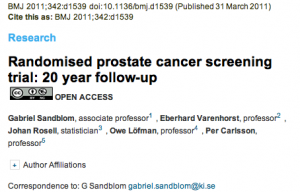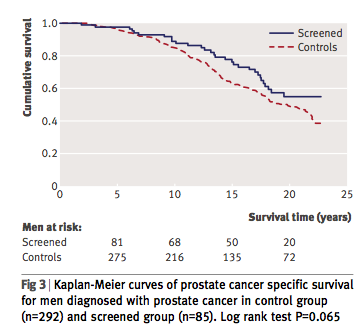Should we screen all men for Prostate Cancer?
One of the ongoing debates in prostate cancer and urology is the value of routine screening of all men in a certain age group. There was a difference of opinion amongst the experts at the recent European Association of Urology (EAU) Congress in Vienna.
 Professor Schröder from Rotterdam summarized what he tells a man who is considering prostate cancer screening:
Professor Schröder from Rotterdam summarized what he tells a man who is considering prostate cancer screening:
Benefit: If your prostate cancer is detected by screening, your chance of dying within 10 years is reduced by at least 20%
Harm: Screening may detect cancer which would never harm you and you may undergo treatment for no good reason.
Research published in the British Medical Journal (BMJ) on March 31, 2011 adds weight to the body of data that suggests general prostate cancer screening is of little or no benefit.
 In an open access BMJ paper, Gabriel Sandblom and colleagues showed that prostate cancer screening did not reduce death rate in a randomly selected population of men between 50-69 who were followed for 20 years.
In an open access BMJ paper, Gabriel Sandblom and colleagues showed that prostate cancer screening did not reduce death rate in a randomly selected population of men between 50-69 who were followed for 20 years.
The study methodology is worth noting.
Take a city in Sweden and randomly select every sixth man aged between 50-69 and screen them for prostate cancer every 3 years. That’s what happened in 1987 in the City of Norrköping in Sweden.
1497 men received four screenings from 1987 to 1996, with the first two being digital rectal examinations (DRE), and the final two screenings combining this with measurement of prostate specific antigen (PSA).
The conclusion from the results published in the BMJ is that :
“After 20 years of follow-up the rate of death from prostate cancer did not differ significantly between men in the screening group and those in the control group.”
There is an ongoing debate on the value of population based screening for prostate cancer, a disease that may affect 1 in 6 men. Like mammography, the benefits of prostate specific antigen (PSA) screening are hotly debated given the potential for overdiagnosis and overtreatment.
The results from the Norrköping study clearly show that where there is no assessment of risk factors or focus of screening on those who might be at risk, there is no significant difference in mortality between those screened and those who are not screened. The study results:
“did not show a significantly longer prostate cancer survival (P=0.065) or overall survival (P=0.14) for men with prostate cancer diagnosed in the screening groups.”

This study of a large group of men over a long-period of time suggests that the risks of screening the general population may not outweigh the potential benefits.
The authors note that in the ERPSC prostate cancer screening trial published in the New England Journal of Medicine in 2009 it was estimated that “to prevent one death from cancer, 1410 would need to be screened and 48 treated.”
While there are advantages if you are the lucky man whose death is prevented, the 47 who have to be treated to “save” you are not so lucky since they undergo treatment risks such as erectile dysfunction, urinary incontinence and bowel problems, not to mention the discomfort associated with prostate cancer biopsy and psychological effects of receiving a false positive result.
This study of 1497 men in a Swedish city over 20 years does not definitively answer the question of whether screening should be done or not. As we have seen in the debate around breast cancer mammograms, emotion can drive health policy decisions as much as scientific data.
However, it does suggest that indiscriminate prostate screening may not be the way to go until more sensitive biomarkers of the disease other than PSA are developed or as the authors in their paper suggest screening is better able to discriminate “indolent tumours from high risk tumours.”
![]() Sandblom, G., Varenhorst, E., Rosell, J., Lofman, O., & Carlsson, P. (2011). Randomised prostate cancer screening trial: 20 year follow-up BMJ, 342 (mar31 1) DOI: 10.1136/bmj.d1539
Sandblom, G., Varenhorst, E., Rosell, J., Lofman, O., & Carlsson, P. (2011). Randomised prostate cancer screening trial: 20 year follow-up BMJ, 342 (mar31 1) DOI: 10.1136/bmj.d1539